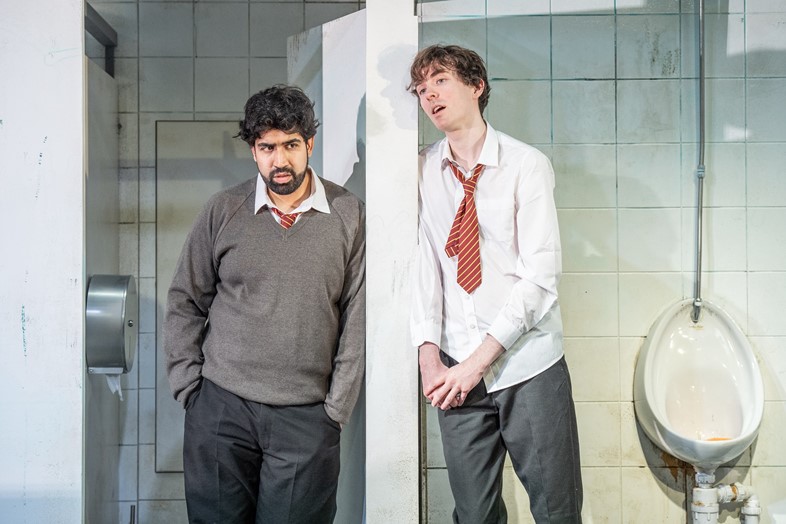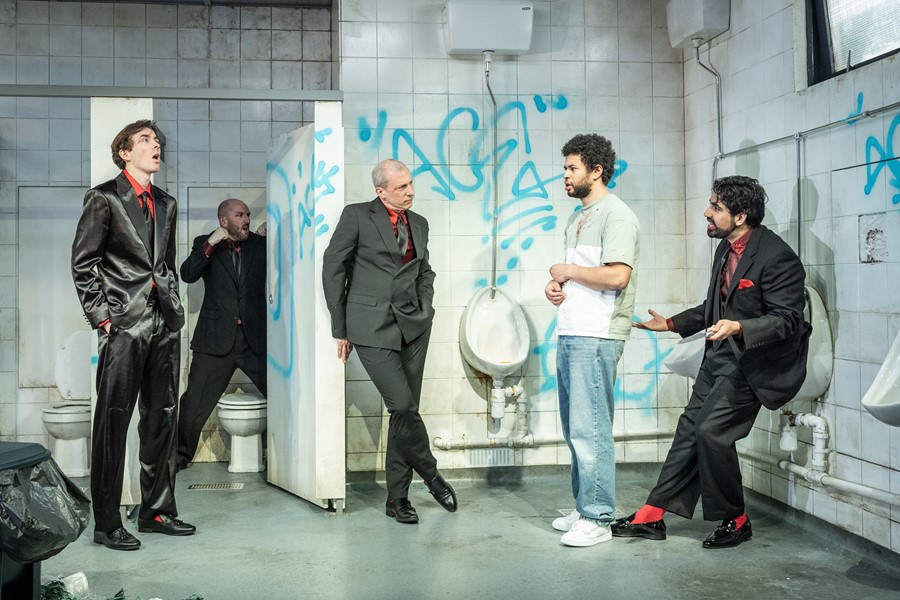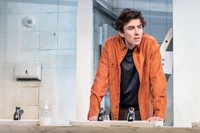Sam Grabiner delves into his new production Boys on the Verge of Tears, which shines a light on men and the performance of masculinity
We’re used to hearing about “toxic masculinity”, but like all terms that catch fire in the media, its meaning has become vague and amorphous over time. Boys on the Verge of Tears, a stingingly poignant new play by Sam Grabiner, moves the conversation on by presenting an authentic spectrum of male behaviour – from the hectoring laddishness of teenage boys to an uncomfortable intimate moment between an adult stepson and his dying stepfather. Everything from body image to sexual assault is explored with empathy and a lightness of touch. Now playing at London’s Soho Theatre, it’s a beautifully fluid piece that takes place entirely in a public toilet. Ashley Martin-Davis’ brilliant set is convincingly dingy, right down to the stained walls.
Grabiner says the initial spark for his play was “pretty specific” – namely, “what would it be like to put a toilet on stage?” After winning Soho Theatre’s Verity Bargate Award for new writing, the London-based playwright is doing just that with a world premiere directed by James Macdonald, whose previous credits include West End productions of plays by Caryl Churchill, Edward Albee and David Mamet. “I suppose I’m always looking for theatrical spaces that can put actors and audiences into vulnerable, strange, uncompromising, funny, bodily kinds of situations,” says Grabiner. ”So when the toilet idea popped into my head, I thought, ‘This is a bit of me.’”
His play is indeed uncompromising in its vision. Five actors – Matthew Beard, David Carlyle, Calvin Demba, Tom Espiner and Maanuv Thiara – play dozens of roles as men of different ages and backgrounds walk into a space that also changes with help from clever lighting and sound design. During one scene, it’s the boys’ toilets at a secondary school; in another, it’s the gents’ at a buzzy nightclub. “It’s doing something you’ve never seen before,” says Macdonald, who knew he wanted to direct Grabiner’s play after reading “about ten pages” of the script. “It’s about something that matters that hasn’t been spoken about in the way this play chooses to speak about it. And I love plays [like this] in which actors get to transform and there’s a total democracy in what the team is being asked to do.”
Boys on the Verge of Tears really captures the performative aspect of masculinity: the way men present a certain version of themselves to avoid looking weak or flawed. For Grabiner, the effort expended by the actors mirrors the exhausting nature of constantly putting on a tough front. “It’s a wild ride with a lot of costume changes, but this almost insane attempt [by the actors] to perform all these parts feels very much at the heart of the play, because the characters are doing the same thing,” he says. “This performance of masculinity – for who? for what? – is a huge part of what it’s about.” Though the actors’ transformations appear seamless to the audience, Macdonald admits that “it’s crazy backstage” and says that during tech rehearsals “the quietest place to be was actually on stage”.
The play’s greatest technical feat is probably an extended scene where a bloodied young man played by Zemba desperately tries to hold it together in a nightclub toilet. Some revellers who walk in show concern for the distraught young man, who has just been beaten up, while others are indifferent and even appalled by him. The scene acquires a surreal quality as it becomes apparent that these revellers are walking in from very different nightclubs. Is the bloodied man only seeing such a random assortment of characters because he’s taken a blow to the head? “It’s probably the most difficult scene to act in some ways because it’s asking the actor to be incredibly truthful but also to show himself breaking down in an increasingly abstract space,” Macdonald says. “The reality of the world is breaking up at that point and I think that makes it the hardest [scene] in terms of hanging on to the truth.”

Though this scene supplies the play’s harrowing centrepiece, it also features glimmers of humour provided by two bearded drag queens. One wishes she’d gone to Soho House instead; the other fetishises the nightclub’s griminess. They call themselves Vanessa Feltz and Maureen Lipman, then riff on famous lines from Lipman’s 1980s BT adverts in which she played a proud Jewish grandmother. It’s another authentic touch that feels rooted in the quirky, colloquial camp of British drag. “That’s something plucked from the deep recesses of my childhood, I think,” says Grabiner. “And I suppose it’s also part of the Jewishness of the play. It felt interesting to have two maternal Jewish figures enter at that point.”
Grabiner says each performance seems to provoke a unique set of reactions, but he thinks there is always “an interesting dynamic” in the room because the demographic on stage – men – is different from the multi-gender audience. It’s safe to assume that some audience members will be more shocked than others by the things that men reveal, unwittingly, when they’re alone together. Macdonald believes Boys on the Verge of Tears leaves us with a question: “Are we capable of learning from the examination of masculinity that this play conducts? Can we as men imagine a better world?” For Grabiner, it’s a play about “cycles” that start at a young age. “I can’t say what people should make of the play,” he says. “But I can speak about what I poured into it, which is trying to understand something and have compassion for it so you can feel your way into maybe breaking those cycles.”
Boys on the Verge of Tears is on at Soho Theatre in London until May 18.






